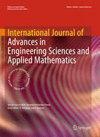Low-carbon no-idle permutation flow shop schedulling problem: giant trevally optimizer vs African vultures optimization algorithm
IF 0.8
Q3 ENGINEERING, MULTIDISCIPLINARY
International Journal of Advances in Engineering Sciences and Applied Mathematics
Pub Date : 2023-09-01
DOI:10.11591/ijaas.v12.i3.pp195-204
引用次数: 0
Abstract
Greenhouse gas emissions continue to increase due to increased energy consumption. One of the largest emission-contributing sectors is the manufacturing industry. Therefore, the manufacturing industry is required to minimize carbon emissions. One of the efforts to solve the emission problem is to minimize machine downtime throughout the production procedure, which stands for no-idle permutation flowshop scheduling (NIPFSP). This article uses two metaheuristic algorithms, giant trevally optimizer (GTO) and African vultures optimization algorithm (AVOA), to solve the carbon emission problem. Both algorithms are tested on 3 cases with 30 runs for every population and iteration. To compare the outcomes of each algorithm, an independent sample t-test was employed. The results show that the GTO algorithm has better results than the AVOA algorithm on small and large case data. The findings indicate that both the GTO and AVOA algorithms yield comparable results when applied to medium-sized research datasets, suggesting their effectiveness in such scenarios.低碳无空闲排列流车间调度问题:巨型三角优化器与非洲秃鹫优化算法
由于能源消耗的增加,温室气体排放继续增加。最大的排放贡献部门之一是制造业。因此,制造业需要尽量减少碳排放。解决排放问题的努力之一是在整个生产过程中尽量减少机器停机时间,即无空闲排列流水车间调度(NIPFSP)。本文采用巨三角优化算法(giant trevally optimizer, GTO)和非洲秃鹫优化算法(African vultures optimization algorithm, AVOA)两种元启发式算法解决碳排放问题。两种算法都在3种情况下进行测试,每次人口和迭代运行30次。为了比较每种算法的结果,采用独立样本t检验。结果表明,GTO算法在小案例和大案例数据上都优于AVOA算法。研究结果表明,当应用于中型研究数据集时,GTO和AVOA算法产生的结果相当,表明它们在这种情况下是有效的。
本文章由计算机程序翻译,如有差异,请以英文原文为准。
求助全文
约1分钟内获得全文
求助全文
来源期刊

International Journal of Advances in Engineering Sciences and Applied Mathematics
ENGINEERING, MULTIDISCIPLINARY-
自引率
0.00%
发文量
6
期刊介绍:
International Journal of Advances in Engineering Sciences and Applied Mathematics will be a thematic journal, where each issue will be dedicated to a specific area of engineering and applied mathematics. The journal will accept original articles and will also publish review article that summarize the state of the art and provide a perspective on areas of current research interest.Articles that contain purely theoretical results are discouraged.
 求助内容:
求助内容: 应助结果提醒方式:
应助结果提醒方式:


